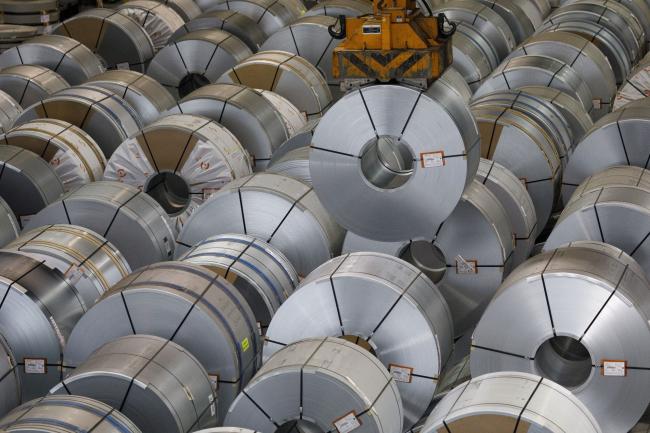Domo signs strategic collaboration agreement with AWS for AI solutions
(Bloomberg) -- Sign up for Next China, a weekly email on where the nation stands now and where it's going next.
Several Chinese provinces have taken the extraordinary step of extending the Lunar New Year holiday to help curb the spread of the deadly coronavirus. Now commodity traders are assessing the impact of the shutdown in the world’s biggest energy user and steel and coal producer.
Regions accounting for about 90% of copper smelting, 60% of steel production, 65% of oil refining and 40% of coal output have told companies to delay the restart of operations until at least Feb. 10. That will likely dent China’s output of many key commodities and may hurt its demand for raw materials, though the extent is less clear as some facilities run at least at partial utilization during the holiday.
The Lunar New Year period is disruptive even in normal years, with many factories and businesses shutting down for about a week to allow workers to travel home. There’s usually an anticipation of a jump in manufacturing activity after the break, but that outlook is muddled amid the unprecedented extension, adding to uncertainty over the economic impact of the virus. China’s trade council said it would provide force majeure certificates to companies that are unable to meet international commitments.
Read More: Least Two-Thirds of China Economy to Stay Shut Next Week
The extended holiday affects the following areas with a total population of more than 850 million:
- Shanghai, Chongqing, the autonomous region of Inner Mongolia and provinces of Guangdong, Zhejiang, Jiangsu, Hebei, Anhui, Fujian, Yunnan, Shandong, Henan and Jiangxi have said businesses need not start operations until at least Feb. 10
- Hubei province, where the virus-hit Wuhan city is located, has said the holiday will last until at least Feb. 14
China is the world’s biggest producer of steel and refined copper, and the regions extending holidays house the bulk of the country’s capacity. Some steel mills in Shandong are already planning to cut output as they have trouble procuring raw materials while orders have dwindled, according to an industry report.
Logistics and labor are challenged amid reports of port disruptions and transportation lockdowns. Even if mills and smelters are able to produce, demand may be hampered by a slowdown in construction activity as workers struggle to return to their home cities.
Oil Refineries
The impacted regions include most of China’s oil refining capacity, led by Shandong province, which is home to most of China’s independent processors known as teapots. Refineries typically continue operating even during holidays because of the danger involved in shutting and starting units full of volatile chemicals.
The biggest hit could be to demand for fuels as people stop driving to work and transporting goods. Oil traders expect Chinese refiners to cut operating rates, with the teapots in Shandong seen as particularly vulnerable.
Read More: CORONAVIRUS AND OIL: Hundreds of Millions Told to Stay Home
Agriculture
The regions combined will account for more than half of China’s livestock industry, according to official statistics for the first quarter of 2018, the latest available data.
The industry has already been hit hard as African swine fever decimated pig herds across the country. The government-mandated quarantine in Hubei province, the epicenter of the disease, is now pushing a flock of more than 300 million chickens to the “edge of death,” according to the region’s poultry association.
Natural Gas
Almost 75% of China’s liquefied natural gas imports arrive at terminals in provinces with the extended holiday, according to Bloomberg calculations. While they have continued to receive cargoes over the holiday period, according to ship-tracking data, some of the fuel will be distributed on tanker trucks and may be affected by road closures.
Chinese LNG traders currently see no impact on imports, but the holiday extension will likely sap factories’ natural gas consumption. City gas and gas-powered vehicles may also be affected by weaker demand from commercial sectors.
Coal Mines
China mines and uses half the world’s coal. Inner Mongolia, one of the affected areas, is the biggest producing region and supplies more than 1 billion tons a year.
Even then, the impact of the output deferment will likely be mixed. While many mines will delay restarts due to the virus, some large mines will continue to operate, according to the country’s leading industry group.
In terms of demand, the resumption of operations at downstream industries including cement and steel will be a major deciding factor.
Solar Panels
China dominates global manufacturing of the components that go into producing solar panels. Regions that extended the holiday make up about 20% of the country’s output of polysilicon, one of the key raw materials, according to BloombergNEF data.
A Norwegian panel maker that manufactures in Singapore has been warned of potential disruptions in component shipments from China by some of its suppliers. Chinese producers including Risen Energy Co. and Canadian Solar Inc. said they are continuing to produce and see little impact from the virus.
